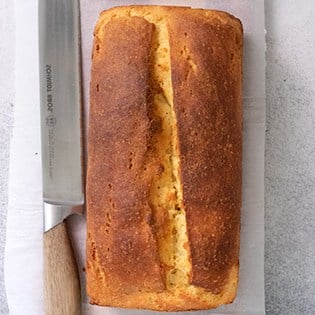

Welcome back to the lightly sweet taste of gluten free brioche bread, rich with eggs and butter, and that golden bakery-style crust and soft yellow crumb inside.

What makes this recipe for gluten free brioche bread special
I consider brioche bread a luxury. One single loaf calls for 5 whole eggs, and 5 ounces of butter, at room temperature.
(Be sure the ingredients are at room temperature, or they won't combine properly.)
To me, all those eggs and butter in a fragrant loaf of bread, with a thick but tender crust and a rich flavorful crumb, sounds dreamy. It certainly has its place. And its place is often soaking in more of the same to make French toast!
This bread is not low fat, or low-calorie. It's an indulgence, and I enjoy it more than if I thought of it like an everyday loaf.
I don't count calories, and I don't think of any foods as “bad.” Everything in moderation.

What to expect during the rise of this gf brioche bread
The many eggs in this loaf of bread help it rise, but it does still call for yeast. You'll find that it doesn't call for a ton of yeast, though.
Since brioche has a somewhat tighter crumb than a classic sandwich bread, it's meant to rise very high. It should rise to about 150% of its original volume, but not more. If you are tempted to add more yeast, know that the loaf won't rise higher, but will just have a more jagged top.
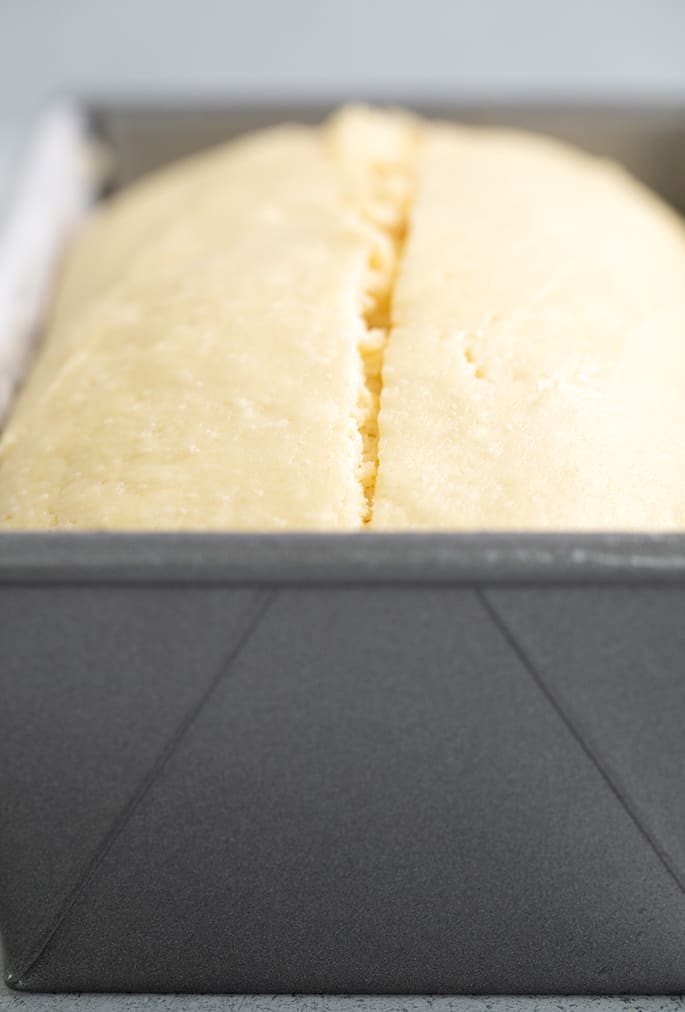
Tips on getting gluten free yeast bread to rise
The linchpin to getting yeast bread to rise is no fun, and no one likes it but it remains true. It's patience.
When I make this bread in the summer, and the air is generally warmer and more moist, it rises so much faster. Sometimes, it only takes 40 minutes!
When I make this bread in the winter, when the air is not only colder but significantly drier (even with a humidifier in our house), it can take nearly 2 hours.
If you bake it too early, it won't likely rise and then fall, since it's not a high-rising bread. But it will be shorter and denser.
Do not put it in a low oven. You'll likely kill the yeast. Don't put it in the dryer. Same deal.
I do often turn on my oven to about 300°F and place the loaf pan on top of the stove. That bit of gentle ambient heat helps it rise more steadily.
When is it done rising?
If your yeast bread is still set to rise, but you're getting nervous that it might “overproof,” there is a telltale sign. If the surface of the dough has begun to rise unevenly, taking on a broken or pockmarked appearance, it's a bit overrisen.
No worries, though. You can moisten your fingers and try to smooth out the rough edges, or just pop it right in the oven and bake as instructed.
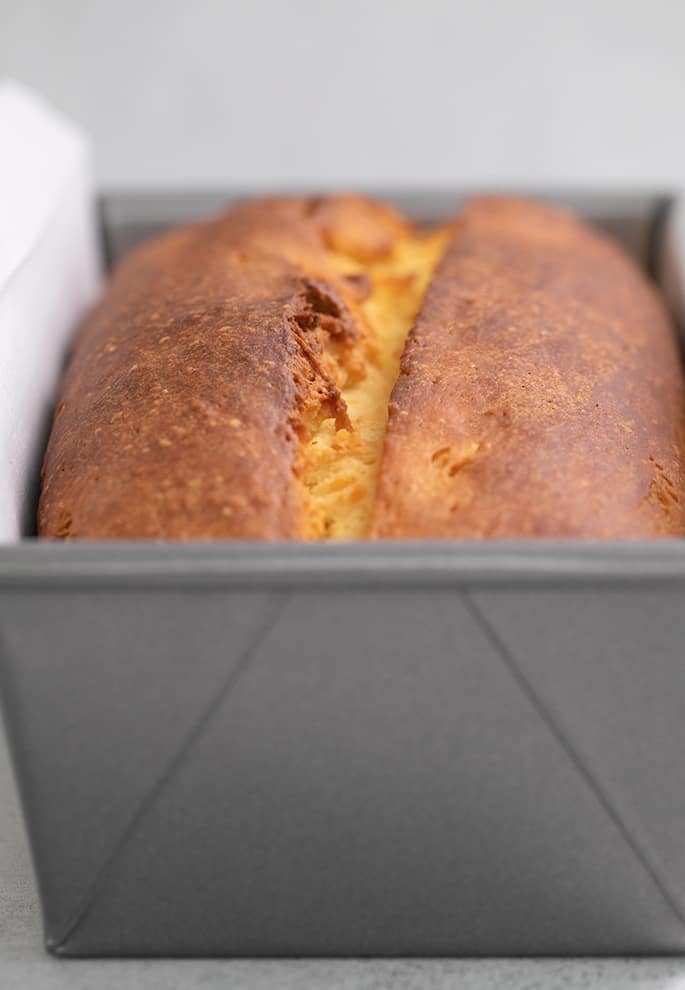
Ingredients and substitutions in gluten free brioche bread
Gluten free dairy free brioche bread
If you can't have dairy, I would normally steer you toward a bread recipe that isn't highly enriched with lots (and lots) of butter, like this one. But I think we can do it!
Try replacing the butter with vegan butter. My favorite brands remain Melt and Miyoko's Kitchen. I love them equally.
In place of the milk, try any nondairy milk you like. Just make sure it's unsweetened and unflavored.
Can you make gluten free brioche bread without eggs?
You can't replace 5 eggs in a single recipe with any sort of egg replacer. Brioche bread is just not egg-free-friendly. You'd need a vegan-style recipe that was developed egg-free.
Can you replace the instant yeast in this gf brioche bread recipe?
This is a recipe for yeast bread, and cannot be made without commercial yeast. It also cannot be made with wild yeast sourdough starter, which requires a recipe developed specifically for it.
I always bake yeast bread with instant yeast, since it doesn't have to be dissolved in liquid, and you need less of it. Instant yeast is also called rapid-rise and breadmaker yeast. It's all the same.
If you don't have instant yeast and would like to use active dry yeast instead, you'll need to increase the amount by 25%. I've done the calculations for you in the Recipe Notes below.
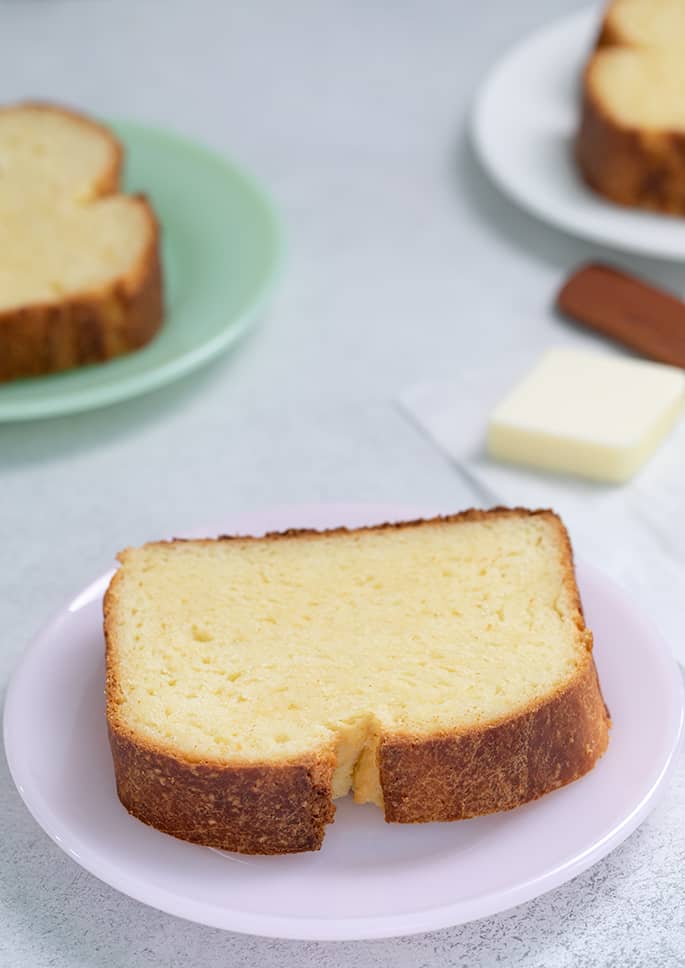
Gluten Free Brioche Bread
Ingredients
- 2 ½ cups (350 g) all purpose gluten free flour blend (I used Better Batter; you must use one of my recommended blends so please click thru for full info)
- 1 ¾ teaspoons xanthan gum omit if your blend already contains it
- ½ cup (100 g) granulated sugar
- 1 ½ teaspoons (5 g) instant yeast (See Recipe Notes)
- 1 teaspoon cream of tartar
- ¾ teaspoon (5 g) kosher salt
- ½ teaspoon apple cider vinegar
- 5 (250 g (weighed out of shell)) eggs at room temperature
- ½ cup (4 fluid ounces) warm milk about 95°F
- 10 tablespoons (140 g) unsalted butter at room temperature, roughly chopped
Instructions
- Grease and line a standard 9-inch x 5-inch loaf pan and set it aside.
- In the bowl of a stand mixer fitted with the paddle attachment (See Recipe Notes), place the flour, xanthan gum, sugar, yeast, and cream of tartar, and whisk to combine well.
- Add the salt, and whisk again to combine. Add the vinegar, eggs, milk, and butter.
- Place the bowl in the stand mixer and beat on medium-low speed for about 30 seconds. Increase the speed to medium-high, and beat for at least 2 minutes. Scrape down the sides of the bowl, and beat on high speed for another 2 minutes.
- Transfer the dough to the prepared loaf pan, pressing the dough firmly into the corners. Using a moistened spatula, smooth the top.
- Cover the pan with lightly greased plastic wrap, and place the pan in a warm, draft-free location until the dough has reached the top edge of the loaf pan. This can take an hour, or it can take much longer, depending upon the rising environment. In cool, dry weather, it may take significantly longer.
- Overproofing is not a function of time, but of rise. When the surface of the dough begins to take on an uneven, pockmarked appearance, it has begun to overproof.
- When the dough has reached the end of its rise, preheat the oven to 375°F. Remove the plastic wrap, score the loaf down the horizontal center using a lame or sharp knife at a 45° angle, cutting about 1/4 inch deep.
- Place the loaf in the center of the preheated oven, and bake for 25 minutes. Rotate the pan 180° in the oven and bake for another 20 minutes.
- For a less browned crust, remove the loaf pan from the oven and transfer the bread to a large piece of aluminum foil. Wrap the bread completely in the foil and continue to bake for another 5 to 10 minutes, or until the inside of the loaf has reached at least 190°F.
- Remove from the oven, unwrap the loaf, and allow the loaf to cool on a wire rack. For a softer crust, keep the loaf wrapped for at least 20 minutes when it first comes out of the oven, and then unwrap to cool until no longer hot to the touch. Slice and serve.
- For a deeper golden brown crust, remove the loaf pan from the oven, transfer the bread to a baking sheet and then return it to the oven. Continue to bake for another 5 to 10 minutes, or until the inside of the loaf has reached at least 190°F. Remove from the oven and transfer the loaf to a wire rack to cool until no longer hot to the touch. Slice and serve.
Notes
Gluten Free Brioche Bread
Ingredients
- 2 ½ cups (350 g) all purpose gluten free flour blend (I used Better Batter; you must use one of my recommended blends so please click thru for full info)
- 1 ¾ teaspoons xanthan gum omit if your blend already contains it
- ½ cup (100 g) granulated sugar
- 1 ½ teaspoons (5 g) instant yeast (See Recipe Notes)
- 1 teaspoon cream of tartar
- ¾ teaspoon (5 g) kosher salt
- ½ teaspoon apple cider vinegar
- 5 (250 g (weighed out of shell)) eggs at room temperature
- ½ cup (4 fluid ounces) warm milk about 95°F
- 10 tablespoons (140 g) unsalted butter at room temperature, roughly chopped
Instructions
- Grease and line a standard 9-inch x 5-inch loaf pan and set it aside.
- In the bowl of a stand mixer fitted with the paddle attachment (See Recipe Notes), place the flour, xanthan gum, sugar, yeast, and cream of tartar, and whisk to combine well.
- Add the salt, and whisk again to combine. Add the vinegar, eggs, milk, and butter.
- Place the bowl in the stand mixer and beat on medium-low speed for about 30 seconds. Increase the speed to medium-high, and beat for at least 2 minutes. Scrape down the sides of the bowl, and beat on high speed for another 2 minutes.
- Transfer the dough to the prepared loaf pan, pressing the dough firmly into the corners. Using a moistened spatula, smooth the top.
- Cover the pan with lightly greased plastic wrap, and place the pan in a warm, draft-free location until the dough has reached the top edge of the loaf pan. This can take an hour, or it can take much longer, depending upon the rising environment. In cool, dry weather, it may take significantly longer.
- Overproofing is not a function of time, but of rise. When the surface of the dough begins to take on an uneven, pockmarked appearance, it has begun to overproof.
- When the dough has reached the end of its rise, preheat the oven to 375°F. Remove the plastic wrap, score the loaf down the horizontal center using a lame or sharp knife at a 45° angle, cutting about 1/4 inch deep.
- Place the loaf in the center of the preheated oven, and bake for 25 minutes. Rotate the pan 180° in the oven and bake for another 20 minutes.
- For a less browned crust, remove the loaf pan from the oven and transfer the bread to a large piece of aluminum foil. Wrap the bread completely in the foil and continue to bake for another 5 to 10 minutes, or until the inside of the loaf has reached at least 190°F.
- Remove from the oven, unwrap the loaf, and allow the loaf to cool on a wire rack. For a softer crust, keep the loaf wrapped for at least 20 minutes when it first comes out of the oven, and then unwrap to cool until no longer hot to the touch. Slice and serve.
- For a deeper golden brown crust, remove the loaf pan from the oven, transfer the bread to a baking sheet and then return it to the oven. Continue to bake for another 5 to 10 minutes, or until the inside of the loaf has reached at least 190°F. Remove from the oven and transfer the loaf to a wire rack to cool until no longer hot to the touch. Slice and serve.
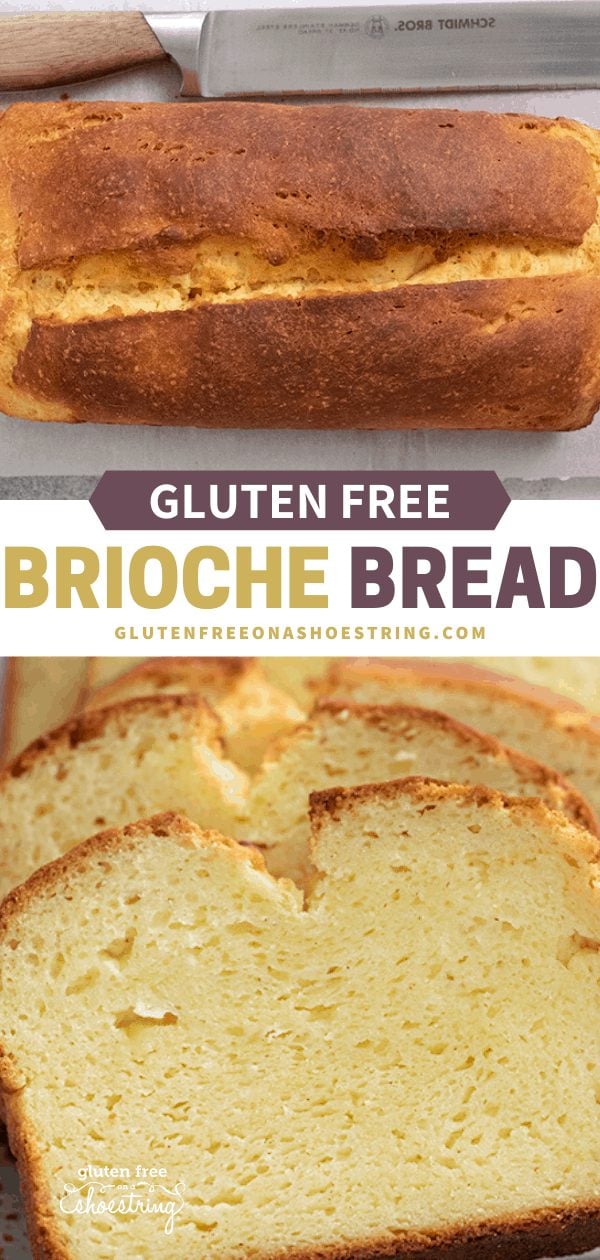
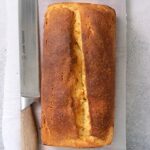

Shalindhi says
Hi Nicole,
My loaf is cooling on its side as I write this…good looking loaf! Dark as well, as expected. I’m lactose intolerant as well as having celiac, so I used Becel margarine. Can’t wait to try it, and hopefully there will be some remaining to try your French toast recipe!
Also made your cinnamon rolls on the weekend and added some pecans, pulsed fine, with the brown sugar/cinnamon. Yum!
Nicole Hunn says
I looked up “Becel margarine,” Shalindhi, since I’m not familiar with it, and it looks like a soft, spreadable margarine. That is not an appropriate substitute for butter in my recipes. Please see the Ingredients and substitutions section of each post for any recommendations I might have. The cinnamon rolls sound lovely!
Rebecca says
Hi there! I was wondering if you would be able to add some raisins and cinnamon to this bread without it affecting the rise?
Nicole Hunn says
You could add cinnamon, Rebecca, but I wouldn’t add raisins, no.
Stacy says
Would this cook the same in a Bundt pan? I want to use it for king’s cake, so I need it to be round. I am so excited about this recipe. I have never tried this gf flour before and hope I can make other recipes from your site with it!
Nicole Hunn says
Hi, Stacy, I don’t recommend that, no. But I do have a recipe for a gluten free king cake. Just use the search function!
Ann says
Nichole, I saw a gf bread recipe that you used a rioux in the preparations? I would like to try it and cannot find the recipe.
Nicole Hunn says
Hi, Ann, that’s Japanese Milk Bread. It’s not a traditional roux, but I think that’s what you mean. Just use the search function and it’ll pop up!
Karen says
I’d like to make this into Brioche rolls. What pan should I use and how long do I bake them for?
Nicole Hunn says
This is a recipe for a loaf of bread, Karen, not rolls. I’m afraid it’s not a simple conversion!
Kristian says
I am very excited to try this. Before my husbands celiac diagnosis one of his favorite things was chocolate chip brioche that we would often make into French toast. Do you think I could mix chocolate chips into this batter prior to proofing? Do you have any suggestions? Thank you for all of your increasingly recipes!
Nicole Hunn says
I’m honestly not sure, Kristian. I would really recommend your making this exactly as written at least once before modifying it in any way.
Molly says
Can you make this ahead and freeze the loaf?
Nicole Hunn says
Absolutely, Molly! I have 2 baked loaves of this very bread wrapped tightly and stored in my freezer right now! You can slice ahead of time and then defrost a slice at a time, if you like.
Laurie says
Gosh, this recipe has me thinking about another sweet bread favorite, Panettone. I tried a bought GF one last year that was terrible. Do you have a good recipe?
Nicole Hunn says
I do have a recipe for gluten free panettone on the site, Laurie, yes. I have to admit that I much prefer the recipe in my bread book, though. I plan to redo the one on the site next year, though!
Marian Lund says
I’ve never eaten brioche. Could I use it to replace croissants in a croissant chocolate custard pudding?
Nicole Hunn says
Croissants are a yeasted pastry, Marian. This is an enriched bread. I’m afraid that’s all I can offer!
Lindsey says
Amazing! Making this bread was a shot in the dark for me, because I used a food processor instead of a stand mixer. The dough became cake batter consistency, and I poured it in my loaf pan expecting a disaster. However, it rose perfectly and turned out beautifully in the oven! I used it for my Thanksgiving stuffing and it was a huge hit. Thanks for the recipe!!
Susan Hersom says
OMG! Nicole, I made the brioche bread, and it is absolutely delicious! Thank you so much!
Nicole Hunn says
You’re so welcome, Susan! I’m so glad you enjoyed it.
Steph K says
This turned out beautifully for me. Thanks so much for the recipe. I made your cranberry bread yesterday, do good too!
Happy Thanksgiving!
Nicole Hunn says
Happy Thanksgiving to you, Steph! Thank you so much for taking a moment to let me know about your Thanksgiving triumphs!
Semi says
Has anyone tried this in a bread maker? Thanks!
Nicole Hunn says
I don’t use or recommend any bread maker, Semi. Please see Bread FAQs.
Shang says
We are a big brioche lovers and I’m really pleased to find a recipe that taste good and easy to make, It took a couple of hours to rise, worth the wait.
Thanks for doing the hard work for us Nicole, I’ve been using your flour mix with your recipes and most turn out really well.
Nicole Hunn says
I’m so glad, Shang. Patience is key!
Esther Siegel says
I just made this bread. It is great, similar to Jewish challah. Very tasty, great consistency. I did a half recipe and used two 5×3 bread pans. Took a little longer to rise than most breads, but worth the wait. thanks for the recipe.
Nicole Hunn says
It’s not a high-rising bread, and in the cold months, it can take its time for sure, Esther. But I’m so glad you agree that it’s worth the wait!
Al says
This was so good! Easy, too! Thank you so much for sharing, Nicole!
Wish I could share how good this looks . . .
Nicole Hunn says
I’m so glad, Al!
André F. says
Looks very good Thank you!
25 minutes + 14 minutes as darkish, unmolded and checked internal temperature… was 193ºF
So now resting. ( and my oven is on temperature and did not use convection ).
French toasts for dinner ;)
Esther Siegel says
I was unable to access your answer to the first question about the Better Batter flour. Is it the same as your gluten-free bread flour in the book and if so do you omit the xanthan gum for this recipe?
Nicole Hunn says
Esther, I’m not sure what answer you’re referring to not being available to you, but this recipe doesn’t call for my bread flour blend. It calls for an all purpose gluten free flour. Better Batter is the all purpose gluten free flour I use, and it already contains xanthan gum, so if you use it, yes, omit the xanthan gum in the recipe.
André F. says
Sorry one more question… “I used Better Batter” do you mean your version of it? if yes, then you do omit the extra xanthan gum…. correct?
Nicole Hunn says
My mock Better Batter is to be used exactly the same as the actual purchased product, André. It contains xanthan gum, just like the branded product.
Jean says
Would monk fruit sugar be alright to substitute for regular sugar?
Nicole Hunn says
I love monk fruit sweetener, Jean, but I’m afraid I’ve never baked with it so I really can’t say!
Shelley says
This looks yummy. I started making Tom’s Gluten Free Sandwich bread months ago and haven’t bought bread since! Now that the weather has changed, I do notice it takes much longer to rise. And then during baking, it rises really tall and then falls once out of the oven. What am I doing wrong here? Not letting it rise enough before baking? Thank you for your feedback.
Nicole Hunn says
If you were making it successfully before, Shelley, and you’re letting it rise as much as before, even if it takes longer, then there has to be something else that you’ve changed. I’m afraid I can’t know what it is that you’ve changed, but I can tell you that baked goods that rise during baking and fall as they cool aren’t fully baked inside and are usually being made in a too-hot oven. Most ovens run hot, which is why I always recommend using a separate analog oven thermometer.
Kat says
This recipe looks amazing, I’d love to try it but I was wondering if I could substitute honey for the sugar required?
Nicole Hunn says
I’m afraid you can’t substitute a liquid sweetener for a granulated one, no, Kat.
Renee E. says
What is the purpose of the cream of tartar in the recipe? I don’t see any baking soda and there’s also some ACV.
Nicole Hunn says
It helps make the bread softer, Renee. It’s common in highly enriched breads.
Julie L says
I am so excited to try this- I miss brioche so much! A couple quick questions: Could I use buttermilk in lieu of regular milk? I usually do this in enriched breads, but not sure if I could here.
Also, could I make rolls with it? Either mounds on a sheet pan or in a muffin tin?
I skimmed the post and recipe, my apologies if I’m asking you to repeat yourself ??
Nicole Hunn says
I haven’t tried that, Julie, so I’m afraid I don’t really know. It’s not much milk though so that should be fine.
I don’t recommend trying to make rolls with this recipe, no. It’s a batter-style bread, not one that can really be shaped.
Jill says
Looks lovely and will be trying it on my next bread making day. 9*12 inch loaf pan?
Nicole Hunn says
Ugh thank you for pointing that out, Jill! I’ve fixed it to read 9-inch x 5-inch loaf pan. As many times as I proofread…. So sorry!